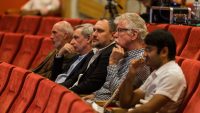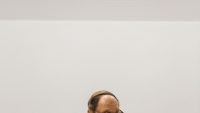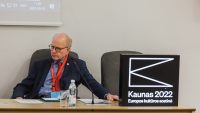Alex Zakletsky: Russian Culture Reproduces Model of Barbaric Behavior

“Culture is a civilization experience of a society in concentrated form, saved on some kind of medium. This saved experience may serve to further develop this society, upgrade its structure, and motivate its people to evolve from a state of savagery to humanity. Here, at this moment, Russian culture shows its main defect – it fails to prevent the atrocities and dehumanization but, conversely, reproduces the model of wild, barbaric behavior and vandalism. All the photos you see here show how really “great russian culture” works”, explained Alex Zakletsky, Ukrainian photographer who introduced his exhibition Geometry of War at Vytautas Magnus University (VMU) on 9th of September. The exhibition’s opening was a part of the program of the 20th session of the European Cultural Parliament (ECP) and Kaunas – the European Capital of Culture. This is the first time an ECP session was held in the Baltic countries.
The photographs in Alex Zakletsky’s exhibition show Ukraine, which has been devastated by the war waged by Russia. According to the photographer, it is not just Ukraine but also its culture that is being destroyed. “Because, first of all, Russians are trying to delete all Ukrainian identity, and identity is culture. The drama theatre in Mariupol was demolished completely, but it’s just one object. In some cities, all cultural infrastructure was demolished. It is a difficult time for freelancers from creative sphere in Ukraine. That’s why I’m asking the parliament to think about supporting some programs for Ukrainian artists and cultural figures. I hope we invent some ideas how to cope with this”, the artist, who has also become a member of the ECP, said. Alex Zakletsky’s exhibition opening in Kaunas was also attended by Nobel Prize nominee, Ukrainian writer Serhiy Zhadan.
Devotes attention to democracy, multiculturalism and immigration
The European Cultural Parliament is a non-governmental organisation which aims to ensure that independent artists would be heard and to intensify the dialogue between artists and other creative individuals. In total, it has about 160 members from 43 European countries: independent artists, writers, musicians, historians, philosophers, designers and other culture representatives from the UK, Sweden, Greece, Ireland, the Netherlands and other European countries. This year the parliament has been joined by 8 new members, including 4 Lithuanians and 2 Ukrainians.
“We aim to remind Europeans that culture is at the heart of society and our future. We discuss democracy, the role of the media and cultural personalities in society and politics, also burning issues like multiculturalism, immigration, etc. This year, we focus on the consequences of war for universities and others in cultural field”, explained the Secretary-General of the ECP Karl-Erik Norrman, who was awarded Honorary Doctorate by VMU.

Culture as a source of resistance and comfort
“I am happy to welcome you in Vytautas Magnus University, which is marking its centennial this year. VMU pursues the goal raised by the European Cultural Parliament: to maintain respectful mutual understanding in the multifaceted cultural sphere. The new ECP members will also contribute towards this goal“, VMU Rector Prof. Juozas Augutis noted in his welcoming speech to the participants of the ECP session at the VMU Great Hall.
One of the new members of the ECP is Prof. Jurgita Staniškytė, the Dean of VMU Faculty of Arts and the chair of the Council of Kaunas the European Capital of Culture 2022 (KECC). Prof. Staniškytė claims that the importance of culture is indisputable: it is the source of human resistance and European identity, and losing it would mean facing new tragedies.
“During the pandemic and war, the main source of comfort and escapism was culture. People want to escape harsh realities of a pandemic and war and look towards culture. Bringing back culture to the agenda, the agency of culture, cultural institutions and artists is very important for the ECP, KECC and VMU”, Prof. Staniškytė emphasised.

Seeks ways to help Ukrainian artists
The Minister of Culture of the Republic of Lithuania Simonas Kairys also spoke during the event. He stressed that it is very significant for Kaunas to become the first Baltic city to host a session of the European Cultural Parliament; however, it is important to not forget the context: the ongoing war in Ukraine.
“When we talk about artists active today, we also must talk about the war. Because the war in Ukraine changed everything. Ukrainian artists today show not only their strengths in the resistance but also the power of cultural diplomacy. They keep protecting not only the garden of freedom but the garden of all European values”, the Minister noted.
The European Cultural Parliament recognises that, during war, it is more important than ever to create more opportunities for Ukrainian artists. “This year, we are looking for ways to develop relationships with Ukrainian artists, to support them. We would like to invite them to participate in the Lithuanian, Baltic and European cultural market. In Lithuania, we often forget that culture is one of the major achievements of Europe”, ECP member, philosopher, VMU Professor Gintautas Mažeikis said.
The Chair of Lithuania’s Seimas Committee on Culture Vytautas Juozapaitis, who became a new member of the European Cultural Parliament, also spoke about the necessity to support Ukrainian artists. “The heroic people of Ukraine are still fighting, and not only by force. Ukrainian artists of highest artistic excellence perform both in Lithuania and in the most prestigious venues across Europe. The Ukrainians’ creativity, optimism, and belief in their victory leave us in no doubt that good will triumph over evil”, Juozapaitis stated and added that hopefully the discussions in Kaunas will lead to new solutions and help generate new initiatives that will further support culture in Europe.
The President of the ECP Pär Stenbäck congratulated Kaunas the European Capital of Culture and thanked VMU for a warm welcome. In his speech, the president encouraged culture representatives to raise their voice against aggression.
“You may claim that a small and idealistic organisation like the ECP has little influence on European affairs. But we are a part of a bigger and ever-growing network of voluntary citizen organisations that slowly but single-mindedly bind the European nations together”, Pär Stenbäck said.

Kaunas 2022 activities were introduced
During the event in Kaunas, the activities of Kaunas – the European Capital of Culture 2022 were also introduced. The impressive program of events, initiatives, projects and exhibitions was presented by the head of Kaunas 2022 Virginija Vitkienė, who has also joined the ECP. According to her, this year, 1,500 events have been organised, including “intellectual carnival”, the Fluxus festival, the Audra festival, which has been named the best Baltic youth festival, an exhibition by Yoko Ono, a lecture by Marina Abramović, the upcoming Litvak Culture Forum and countless other events in Kaunas and its region.
The Kaunas 2022 program will conclude with the event called Contract, which will offer the sounds of opera, electronic music, jazz, and Čiurlionis-like motifs. In total, more than 150 performers, actors and dancers will perform. According to Virginija Vitkienė, Ukraine will also be remembered at the event.
“We feel Ukraine in our blood, because we are a country of the same fate. And we know exactly what it means, with our personal stories. Happily, our stories finished in 1990, but Ukraine has to fight for Ukrainian values today. So thank you, Ukrainians”, the head of Kaunas 2022 said.
The new Lithuanian members of the European Cultural Parliament are the Chair of the Committee on Culture of the Seimas of the Republic of Lithuania Vytautas Juozapaitis, the Dean of VMU Faculty of Arts, the Chair of the Council of Kaunas – the European Capital of Culture 2022 Prof. Jurgita Staniškytė, pianist, lecturer of VMU Music Academy Rimantas Vingras, and the head of Kaunas 2022 Virginija Vitkienė.
The 20th session of the European Cultural Parliament was held at Vytautas Magnus University (VMU) and the premises of Kaunas – the European Capital of Culture 2022 on 8-11 September. The event was a part of the program of Kaunas – the European Capital of Culture 2022.










































































































































































